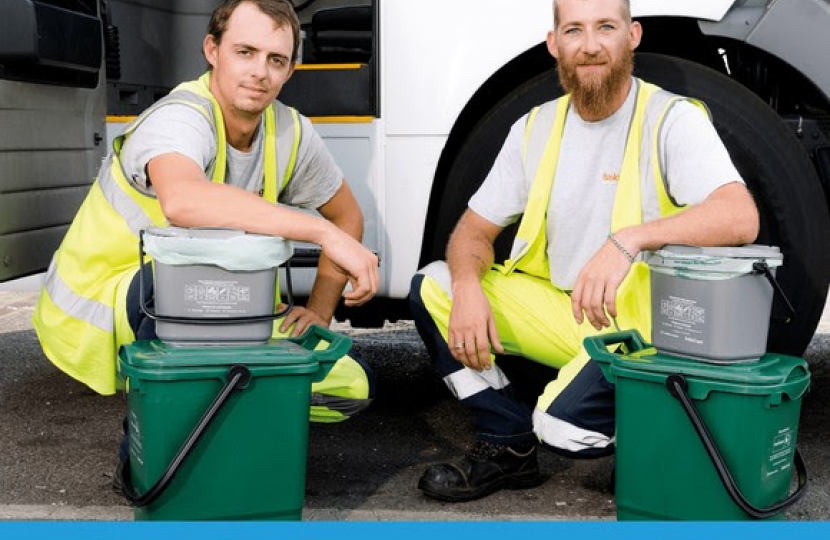
We have concluded the first week of our new separate food and garden waste collection regime
Households across the borough are getting to grips with their new weekly food waste collections.

by
Cllr Kevin Blake, Cabinet Member for Environment & Carbon Reduction
They say councillors often talk a load of rubbish but this time I actually am! Last week saw the introduction of our new food waste collections and, so far, you guys have all been superb in helping us. Having consulted the public in the Summer of 2021, and received over 7,000 responses, which were overwhelmingly positive to the proposed changes, I am aware it will take some time for the new regime to bed in.
As a councillor for the past 30 years, I am well aware of just how much local people in Basildon appreciate our excellent waste services - not least of all our hard working waste collection operatives. It is the one area that almost everyone agrees the Council provides an outstanding service. So why are we messing about with it?
The short answer is that we have to. With the introduction of the new Environment Act last year, all local councils are now required by law to collect food and garden waste separately. But why would they introduce such a law? There are several reasons.
"They say councillors often talk a load of rubbish but this time I actually am!"
Firstly, it is better for the environment and our climate. Basildon Council is working hard to become carbon neutral by 2030 and separating food waste for recycling will help reduce our impact on the environment. By increasing the amount of food waste we recycle and reducing what we send to landfill, we can significantly reduce our carbon emissions. Currently, we estimate food waste makes up roughly a third of what is going into black sacks and, when this goes to landfill, it generates a lot of greenhouse gases. Secondly, it might just stop so many black sacks getting ripped open by animals, which will be nicer for all of us! Thirdly, it will help us meet our recycling targets. Currently, our recycling rate is only 45%, which is just not good enough in this day and age. We would like to reach 65% by 2035. That is our ambition and I believe we can do it.
Finally, it is also better for all of us as taxpayers. Separating food and garden waste comes at a massively increased cost to you, the hard-pressed local taxpayer. All told, it would cost you all over £1 million to keep separate weekly food and garden waste collections. Food waste is more expensive to treat than garden waste and, when they are all mixed together, all the waste has to be treated as food waste - at higher cost. By introducing the fortnightly garden waste collection, we are actually saving £500,000 a year. Garden waste can account for two thirds of the tonnage, so we are currently wasting a lot of money having to have it treated at the higher cost unnecessarily.
"Currently, our recycling rate is only 45%, which is just not good enough in this day and age. We would like to reach 65% by 2035. That is our ambition and I believe we can do it."
Additionally, did you know we can generate energy from waste? We can capture methane during the treatment process and this can be used to generate electricity. Collecting food waste separately will mean we can improve the amount of energy generated.
Remember, going forwards your food waste will now be collected weekly along with your black sacks and your garden waste will be collected on the same week as your glass recycling. You should all by now have received your 5-litre indoor kitchen caddy and a 23-litre outside caddy to transfer your food waste into when your indoor caddy is full. On your rubbish collection day, just leave the 23-litre caddy at the edge of your property and the guys will pick it up, dispose of the food waste and return it to the edge of your property. If you have not received your caddies or you have any other questions, please email recycling@basildon.gov.uk.

